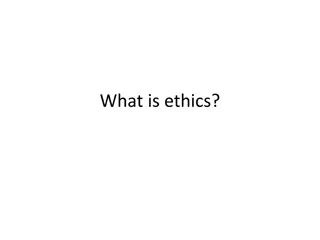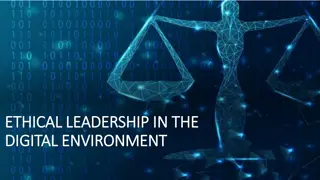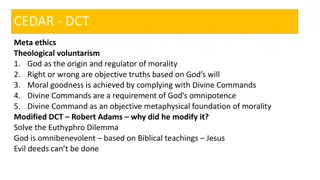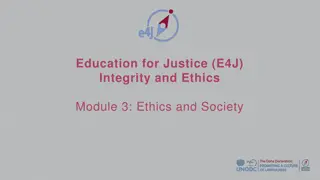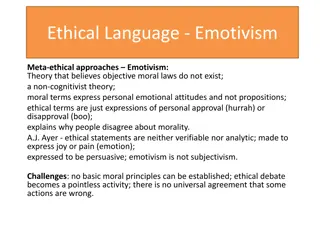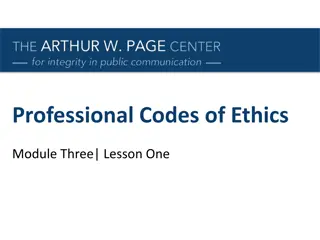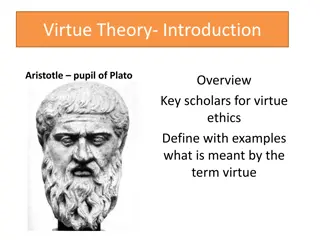Understanding Emotivism: A Non-Cognitivist Theory in Ethics
Emotivism is a meta-ethical theory that posits the absence of objective moral laws, suggesting moral terms express personal emotional attitudes rather than propositions. Influenced by philosophers like A.J. Ayer and Hume, it challenges the existence of basic moral principles and universal agreement regarding morality. Emotivism faces criticisms for making ethical debate seemingly pointless due to the subjective nature of moral terms.
Uploaded on Sep 26, 2024 | 0 Views
Download Presentation

Please find below an Image/Link to download the presentation.
The content on the website is provided AS IS for your information and personal use only. It may not be sold, licensed, or shared on other websites without obtaining consent from the author. Download presentation by click this link. If you encounter any issues during the download, it is possible that the publisher has removed the file from their server.
E N D
Presentation Transcript
Ethical Language - Emotivism Meta-ethical approaches Emotivism: Theory that believes objective moral laws do not exist; a non-cognitivist theory; moral terms express personal emotional attitudes and not propositions; ethical terms are just expressions of personal approval (hurrah) or disapproval (boo); explains why people disagree about morality. A.J. Ayer - ethical statements are neither verifiable nor analytic; made to express joy or pain (emotion); expressed to be persuasive; emotivism is not subjectivism. Challenges: no basic moral principles can be established; ethical debate becomes a pointless activity; there is no universal agreement that some actions are wrong.
Half term DIL Recap 1. What does deontological mean? 2. What does teleological mean? 3. Give an example of a Divine Command 4. How did Adams change the DCT? 5. Define virtue? 6. What is the Golden Mean? 7. What are the Beatitudes? 8. What is cultural relativism? 9. What is psychological egoism? 10.What is ethical egoism?
1 d and e Summary so far . . . Naturalists we can examine morals in the same way we examine other features of the universe. They believe that morals are part of the natural world and are discoverable using reason. Intuitionism we have a special faculty within us that considers the facts that our senses perceive and then makes a moral judgement Some philosophers reject this and claim we can t have moral knowledge - emotivism
1F. Meta-ethical approaches Emotivism Candidates should be able to confidently explain with clarity what Emotivism is (see Moral Philosophy: A Guide to Ethical Theory by G., Hayward, J. and Cardinal, D. (Hodder Murray)); they must have a good understanding of Ayer's view of Emotivism. Candidates need to study the criticisms listed of Emotivism and have a clear knowledge of each criticism and why it is specifically damaging to the meta-ethical theory of Emotivism.
Emotivism Background Influenced by (Big Dave) Hume, he rejected naturalism (is-ought gap) and believed sentiment or feelings was the source of right and wrong. He believed we all have the capacity for compassion, but it has nothing to do with reason. When we say that something is right/wrong, we make a value judgement and not a factual statement Why did Hume believe we should help someone in need? Not because of reason or . . .. 1. Write a twenty word introduction to the essay question Explain the meta ethical approach of Emotivism
Emotivism ethical non- naturalism Grew out of the work of logical positivists and A J Ayer. Found metaphysical language problematic Claim that ethical statements are not factual propositions, they can t be verified or falsified Therefore, ethical statements are meaningless Logical Positivists Read page 15 Find a definition of - Analytic and synthetic To discuss 1. What does metaphysical mean? 2. What is a proposition? 3. What is a value judgement? 2. Complete the activity on page 16 3. Read the bullet points and turn them into a detailed and accurate AO1 paragraph include definitions of analytic and synthetic
Emotivism A J Ayer Often referred to as the Hurrah-Boo theory A J Ayer argued that to make ethical claims is to make statements which create certain emotional responses Therefore ethical language can only be useful as information within a particular group to which people belong. i.e contraception is wrong becomes useful amongst Catholics who have like minded opinions. Claims only ever show what is true for the speaker 3. Add another paragraph to your essay include examples That is wrong =Boo! I don t like it
Tasks 1. What did Hume mean when he said all is sentiment with regard to ethics? You can t go from an is to an ought . Explain what this means Which group of philosophers believe you can go from an is to an ought ? Explain the difference between synthetic and analytic statements Ayer s theory is known as the boo/hurray theory. Explain what this means with reference to the statements Euthanasia is wrong and A just war is right . To think about Categorise the following statements as synthetic, analytic or meaningless, in emotivist terms: a. You re a bad person b. The book is under the bed c. All cats are feline d. God exists e. All murder victims have a murderer f. It s wrong to murder g. He was murdered h. 2 +2=4 2. 3. 4. 5.
Emotivism, a development - Stevenson CL Stevenson said the purpose of a moral statement was to persuade someone of the rightness or wrongness of an action. Good is a persuasive definition. He said that when we talk about moral issues, we express approval or disapproval. Unlike Ayer, he said moral statements were not merely expressions of emotion, but were based on deeply held beliefs. This gives a better explanation of why people disagree strongly about morality their ideas are based on fundamental social, political or religious beliefs. However, Stevenson is an emotivist because he believes moral statements are the result of subjective opinions, views or beliefs.
Emotivism -Challenges 1. No basic moral principles can be established 2. Ethical debate becomes a pointless activity 3. There is no universal agreement that some actions are wrong
No basic moral principles can be established Critics of emotivism ask if it is a moral theory at all as it does not lead to basic moral principles. If all behaviour is just about how we feel, how can we know anything? Can we not prove in some rational way that telling the truth is morally preferable to lying; that caring for animals is morally more justifiable than abusing them; that being loyal to partners is more acceptable than betrayal? If ethical claims were contingent on emotions, wouldn t ethical claims change as emotions changed? So we could have not moral principles
Ethical debate becomes a pointless activity As an ethical theory emotivism undoubtedly fails because it does not take into account the connections between moral judgements and reasons. For an emotivist a moral judgement is like a command - it is chiefly a verbal means of trying to influence other people's attitudes and behaviour. Therefore, there is no point engaging in ethical debate For example, imagine that I am trying to convince you that a certain politician is evil, but you disagree. Knowing that you are a communist, I tell you that the politician in question is a fascist. This does the trick. Your attitude towards him changes and you agree that he is evil. It would seem then that for the emotivist the fact that the politician is a fascist is a reason to agree with my judgement that he is evil. However, no fact can count as a reason in support of any judgement. Although our values are usually little more than the expression of our subjective feelings, moral judgements can ultimately only be true if backed by reasons. In considering questions of morality, one must ask why a moral judgement should or should not be accepted. One might have strong feelings and might choose to ignore reason, but by doing this one is opting out of moral thinking. Moral thinking is about weighing up reasons. By focusing only on feelings, emotivism as an ethical theory fails. To put it crudely, the emotive theory reduces morality to a set of cheers or boos, sounded off in response to experiences that are liked or disliked. Some people may indeed make moral statements on that basis, but it does not do justice to the rational character of moral argument or debate.
There is no universal agreement that some actions are wrong Sometimes, we hold on to absolute an intrinsic rights and wrongs so emotivism is wrong to say there are no universal rules If ethical claims are purely subjective, does this mean that there is no universal code? This would mean no room for meaningful debate Assumes that ethical claims are based on the response of the listener and not on the value of the claims themselves
Emotivism -Challenges From Bowie Rachels Ayer is wrong to remove reason from moral judgement
Starter Ethical views of the perception and existence of moral norms Naturalism - Bradley Naturalists and intuitionists agree that . . . Naturalist and emotivists agree that . . . But disagree that But disagree that Do objective morals exist? How are morals are perceived? Can empirical tests reveal facts about the world? Intuitionism Moore and Pritchard Emotivism - Ayer Emotivists and intuitionists agree that . . But disagree that . . .
Challenges to Emotivism Quiz Use your notes to answer these questions 1. What are absolutist ethics? 2. What are the advantages of absolutist ethics? 3. What are subjective ethics? 4. What is the problem with subjective ethics? 5. Why does emotivism seem to disregard the value of ethical claims? 6. Why does emotivism make ethical debate pointless? 7. What other name is emotivism known by?
AO2 Lines of argument Moral terms do not attempt to define what terms like right or wrong mean they are just moral agents' emotional response to situations (Ayer, emotivism, boohurrah theory). Viewing moral terms as expressions of emotion would explain the diversity of moral opinion that we see across cultures and within our own culture. An intuitionist response which seeks to explain these differences by positing that there are different intuitive abilities at work feels like a cop out . We can measure emotions and even explore the biological foundations of emotions. There has been no similar claim when it comes to Intuitionism. Instead of empirical evidence for Intuitionism there are conflicting and unsubstantiated claims that intuitions come from God, the gut or genetics. If moral terms were only expressions of emotions then there would be no point in real moral debate. The emotional responses people give are based on some inner belief or conscience something more than feelings. Bradley would say moral terms express propositions, which can be seen as true or false by considering objective features of the world. Asserting moral statements as mere expressions of emotions is a way of defining moral terms. This leads us back to Moore s naturalistic fallacy and the rationality of not defining moral terms.
Key questions that may arise could be: 1. Is it true that our strong feelings of approval or disapproval are the only force behind our ethical statements? 2. Is it really true that different intuitive abilities are the reason for moral disagreements? 3. Are there really objective features of the world or is every observation really an interpretation? 4. Do common ethical approaches across cultures really point to an objective morality? 5. Isn t truth or falsity in the eye of the beholder? Possible conclusions to some arguments put forward could be: 1. Moral terms are expressions of emotions 2. Moral terms are not at all the expressions of emotion, they are objective and absolute features in the world. 3. Moral terms may have both an emotional pole and an objective pole it is difficult or impossible to untangle one from the other.
The extent to which moral terms are just expressions of our emotions They are expressions of emotions It is true to say that moral opinions are often formed on the basis of gaining other s approval or avoiding their disapproval (in childhood for example). History reveals many examples of emotivist methods of expressing moral views, even if they are not verifiable, for example Hitler s condemnation of the Jewish people and current extremist views such as those proposed by the Westboro Baptist Church. The theory highlights the reason why moral disputes are impossible to resolve decisively they are simply an emotional response It acknowledges and in some way values the existence of moral diversity. They are not expressions of emotions
Emotivism Strengths It highlights the reason why moral disputes are impossible to resolve decisively. It acknowledges and in some way values the existence of moral diversity. It is true to say that moral opinions are often formed on the basis of gaining other s approval or avoiding their disapproval (in childhood for example). History reveals many examples of emotivist methods of expressing moral views, even if they are not verifiable, for example Hitler s condemnation of the Jewish people and current extremist views such as those proposed by the Westboro Baptist Church.
TASK Prepare a 10 minute revision session to explain either Divine Command Theory, Virtue Theory, Ethical Egoism, Naturalism, Intuitionism, Emotivism or the challenges to each theory. The lesson must include resources (not a PPP, you get enough of that from me!) The lesson could be a starter or plenary and must cover the concepts, alongside scholars, challenges and strengths.
AO2 Whether one of Naturalism, Intuitionalism or Emotivism is superior to the other theories Theory Is superior strengths Isn t superior - challenges Naturalism Intuitionalism Emotivism
The extent to which the different meta-ethical theories encourage moral debate Theory Encourages moral debate Does not encourage moral debate Naturalism Intuitionalism Emotivism






